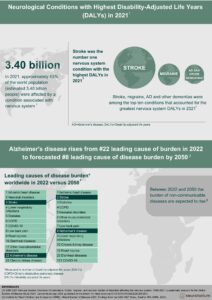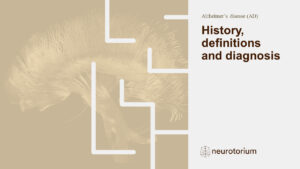Index for
slide deck
Introduction

Course, natural history and prognosis

Course, natural history, prognosis and their clinical significance
References:
1.APA Dictionary of Psychology Webpage. Disease course. Available at: https://dictionary.apa.org/disease-course. Accessed August 2023.
2.CDC Introduction to Epidemiology Webpage. Available at: https://www.cdc.gov/csels/dsepd/ss1978/lesson1/section9.html. Access…

Alzheimer’s disease is not a part of normal aging

The typical course of Alzheimer’s disease
The ‘preclinical’ stage precedes mild cognitive impairment (MCI) and includes individuals who have evidence of early AD pathological changes, but do not meet clinical criteria for MCI or dementia.7 Three stages of preclinical AD were first defined in 2011.7 In Stage 1, in…

Clinical staging of dementia

New clinical staging of Alzheimer’s disease
Disease stage can be based on aetiology, clinical history, anatomical distribution of pathology, or biological features.3 Clinically determined stages to categorize AD lack specificity, however they do provide prognostically relevant information.3 Numerical clinical stagi…

Characterizing the progression of cognitive impairment
The severity of cognitive impairment in patients with AD varies.1 Clinical diagnosis of cognitive impairment in individuals is important for the overall care of the individual.1 There has been improvement in the level of awareness of dementia in primary care and specialis…

The symptoms of Alzheimer’s disease

The symptoms throughout the Alzheimer’s disease
The symptoms of AD can be generally divided into three categories – cognitive, functional, and neuropsychiatric. Cognitive symptoms in AD include memory, language, attention and executive functions, visuospatial skills and praxis (processing).2 These impairments can manif…

Biological staging of Alzheimer’s disease
Development of the National Institute on Aging (NIA)–Alzheimer’s Association (AA) research framework system for staging was designed to stage two types of information independently from each other – disease severity using biomarkers, and the severity of cognitive impairme…

Phases of Aβ buildup in Alzheimer’s disease brain
In vivo neuroimaging data from neuropathological studies show a spatiotemporal development of Aβ deposits in the brain, which originates in the cerebral regions and spreads from the neocortex, to the allocortex, to the brainstem, finally reaching the cerebellum.1,2 Aβ agg…

Braak's neurofibrillary pathology correlates with cognitive impairment
The staging method developed by Braak and Braak suggests that the neurofibrillary pathology of AD progresses in a relatively predictable sequence across the medial temporal lobe structures, subcortical nuclei, and neocortical areas of the brain in seven stages, with the f…

Hypothetical biomarker model of Alzheimer’s disease pathophysiology
The time-course of biomarker abnormalities and the point at which they become detectable can help determine the primary cause of AD progression.3 The A/T/N biomarker classification system for AD includes three main classes of biomarkers – Ab, tau, and neurodegeneration – …

Life expectancy after diagnosis of Alzheimer’s disease










